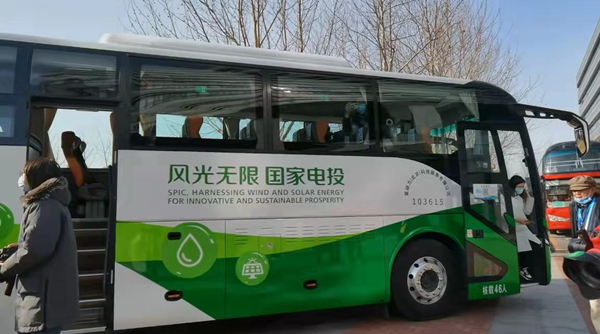Beijing's Changping unleashes high tech creativity
- By Zhang Jiaqi
 0 Comment(s)
0 Comment(s) Print
Print E-mail China.org.cn, February 14, 2022
E-mail China.org.cn, February 14, 2022

While Beijing is presenting the world with a green Winter Olympics, hydrogen fuel is playing its part. Some 150 hydrogen-powered buses developed by the State Power Investment Corporation Limited (SPIC) are currently in use for the Games in downtown Beijing and suburban Yanqing.
Zhang Yinguang, general manager of SPIC Hydrogen Energy Co., Ltd., introduced the company's achievements during a visit to SPIC by 40 journalists from over two dozen Chinese and foreign media outlets. Located in the Future Science City in Beijing's northwestern Changping district, SPIC is just one of over 500 energy companies located here in the "energy valley."
In recent years, Changping district has seen continued growth in high tech creativity. Over the past decade, the Future Science City in the district has expanded from around 10 square kilometers to over 170 square kilometers, bringing together increasingly innovative market entities.
So far, the buses developed and manufactured by SPIC have performed well in terms of both technological reliability and service quality, boosting the industry's confidence in popularizing the use of hydrogen energy, said Zhang, adding that "the Winter Olympics will be of milestone significance to the development of hydrogen energy."
According to Fan Jihong, head of SPIC Research Institute, by the end of last year, SPIC's installed capacity of new energy was 79.36 million kilowatts, ranking first in the world.
Besides the energy companies, life science research institutes, labs and companies are also clustered in the Future Science City, forming a "life valley."
Beijing InnoCare Pharma is one of over 500 innovation-based companies in the "life valley," and its proprietary drug "orelabrutinib" was approved for marketing in China and included in the national reimbursement drug list last December, benefiting lymphoma patients.
According to Lu Chunhua, senior director of corporate communication at InnoCare, the company has submitted 224 patent applications and been granted 37 patent licenses in China and around the world since its inception in 2015.
"Innovation is always the foundation for the biotech industry, and we are happy to grow in Changping, which is a hotbed for innovation in Beijing," Lu said.





